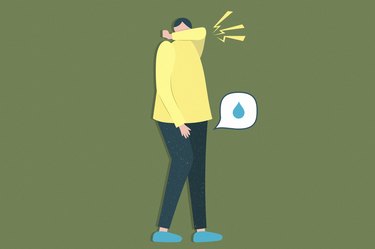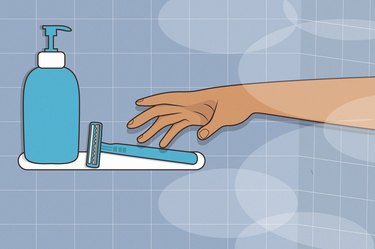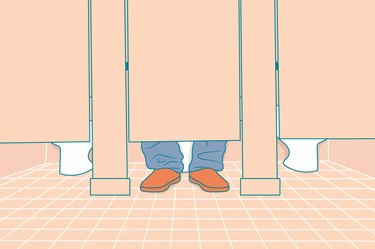
Ever sneezed or coughed and accidentally peed a little at the same time? It can be an unwelcome surprise, but it's probably more common than you think.
In fact, about 1 in 3 people assigned female at birth deal with this issue (which is medically known as stress urinary incontinence, or SUI) at some point in their lives, according to the American Urological Association (AUA).
Video of the Day
Video of the Day
(SUI is less common among people assigned male at birth, but some experience it after certain injuries or surgeries.)
And it's not just sneezing that triggers leaking. Coughing and laughing, as well as certain physical activities, like jumping, running and lifting, can also cause people with SUI to leak anywhere from a few drops of urine to an amount that makes a change of clothes necessary.
For some, SUI is a source of embarrassment that affects their quality of life. For others, it's a minor inconvenience. But from a medical perspective, is it normal to pee when you cough or sneeze?
We spoke with a pelvic floor physical therapist and a urogynecologist to better understand stress incontinence, what causes it and the best way to treat it. Here's what you need to know.
Why Do You Pee When You Cough or Sneeze?
Peeing when you cough, sneeze, laugh or exercise is caused by a change in intra-abdominal and diaphragmatic pressure, says Tracy Sher, PT, DPT, founder and CEO of Pelvic Guru and owner of Sher Pelvic Health.
"You get pressures that are pushing down, and the pelvic floor muscles and the structures there, in general, aren't able to match that pressure," she tells LIVESTRONG.com.
When you have stress incontinence, your pelvic floor muscles may be weakened, lengthened or lacking coordination.
To that last point: "There are some people who have really good pelvic floor muscle strength, but in the moments they need that strength, like when they cough or need to lift something, they aren't able to mobilize those muscles to do what they need them to do," says Jocelyn J. Fitzgerald, MD, a urogynecologist who's board-certified in female pelvic medicine and reconstructive surgery.
And in some cases, too-tight pelvic floor muscles may actually be to blame, says Sher, who sees this problem often in athletes, particularly gymnasts and lifters.
"They have what we call an active insufficiency, or tightness of the pelvic floor," she says. "When they have too much [intra-abdominal] pressure, they're not able to contract anymore because they're already at the top of that contraction."
People with SUI can often track their issues back to pregnancy or childbirth, repetitive movement patterns or the hormonal shifts of menopause. But, in some cases, the root causes of stress incontinence remain unclear.
"Some people have stress incontinence, and it's not because of anything they did," Dr. Fitzgerald says. "I don't want anyone to think having stress incontinence is their fault because they didn't do enough Kegels or because they lifted incorrectly. It can happen for reasons that maybe we don't fully understand yet."
How to Stop Peeing When You Sneeze
Getting checked out by a specialist like a urogynecologist or a pelvic floor physical therapist can help you better understand and address the reasons for your SUI.
But both Sher and Dr. Fitzgerald recognize that not everyone may be able to afford or make time for these appointments. And on top of that, not everyone has easy access to these specialists where they live.
Luckily, there are some things you can do on your own to potentially improve symptoms of stress incontinence and stop peeing when you cough or sneeze.
1. Do Kegels
If your pelvic floor muscles are weak, doing pelvic floor contractions, aka Kegels, can help strengthen them and prevent leaking when you cough or sneeze.
Here's how to do them, per the National Library of Medicine:
- Make sure your bladder is empty, then sit or lie down in a comfortable position.
- Tighten your pelvic floor muscles (imagine you're sitting on a marble and tighten your pelvic muscles as if you're lifting the marble, per the Mayo Clinic — you should feel the muscles in your vagina and/or anal area get tight and move up, while your stomach, thigh and butt muscles stay relaxed). Hold for a few seconds.
- Relax the muscles for a few seconds, then repeat.
Because the pelvic floor muscles include different types of muscle fibers, it's important to do both quick contractions, during which you squeeze the pelvic floor muscles for 1 second and release immediately, and slow contractions, which require you to hold the contraction for about 10 seconds before relaxing, Sher says.
She recommends doing three sets of 10 reps of each type of contraction every day, which adds up to 60 Kegels total.
But don't get discouraged if that number seems overwhelming or you struggle to fit these exercises into your schedule. "I always tell my patients that doing one set a day is better than none," Sher says.
2. Try a Pelvic Floor Trainer
Dr. Fitzgerald notes that some people find pelvic floor trainers helpful, like the Elvie Trainer ($199, Walmart).
These trainers are inserted into the vagina and use biofeedback to help you better visualize your pelvic floor movements as well as smart technology to track your overall progress.
3. Focus on Your Breath
"When you breathe in, that's when the pelvic floor relaxes. And as you're breathing out, that's when you get a gentle contraction of the pelvic floor," Sher says.
Aligning your physical activity so you're exhaling on the effort (e.g., hitting a tennis ball, spiking a volleyball or snatching a barbell overhead) and not holding your breath can help you better manage intra-abdominal pressure during exercise and potentially improve workout-related SUI.
4. Stop Peeing 'Just in Case'
It may seem like a good idea to hit the restroom one last time before you leave the house even though you just went 20 minutes ago, but habitually peeing "just in case" can cause bladder issues that affect SUI.
"Your bladder is actually super sensitive, and if you go to the bathroom a lot, it will change the threshold so that you will definitely need to go to the bathroom more," Sher says. "Even if you do the best pressure management and pelvic floor stuff, if you're constantly feeling an urge to go to the bathroom, there's just going to be that extra sensitization that makes you potentially leak when you cough or sneeze."
Try regulating your bathroom trips (keeping a log can help) so you're only going every two to four hours.
5. Stay Regular
Don't ignore chronic constipation, which is typically defined as passing fewer than three bowel movements per week.
An enlarged colon puts more pressure on your bladder, and straining on the toilet can weaken the muscles and ligaments of your pelvic floor.
The best natural remedies for constipation include getting regular exercise, drinking plenty of water, eating fiber-rich foods and sitting on the toilet at the same time every day to get your bowel movements on a regular schedule.
6. Check In With a Professional
If you've tried addressing the issue on your own and aren't seeing any improvements, it's time to get professional help.
A general practitioner or gynecologist may be able to point you in the right direction, but specialists like urogynecologists and pelvic floor physical therapists regularly diagnose and treat SUI. They can tailor treatment, like physical therapy, to your unique situation or help you determine if you should pursue other interventions.
So, How Bad Is It Really to Pee When You Sneeze?
SUI is not a life-threatening condition, so how "bad" it is depends on your perspective and how much it bothers you. Some people leak once and immediately seek help, while others manage their symptoms by wearing pads or changing clothes.
Is it normal to pee when you cough or sneeze, though? Sher emphasizes that SUI isn't a "normal" or inevitable thing that you just have to accept. Even if you've been peeing when you sneeze for 20 years, you can still be treated and improve your condition and quality of life.
"It's never too late," Sher says. "Even if you've had these symptoms for a long time, there's still help for it."
Is this an emergency? If you are experiencing serious medical symptoms, please see the National Library of Medicine’s list of signs you need emergency medical attention or call 911.



